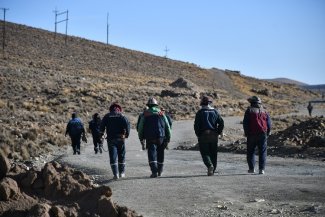On 24 August, Jordan became the sixth country in the Middle East North Africa (MENA) region to have an approved or pending IMF loan programme. The other countries are Egypt, Iraq, Morocco, Tunisia and Yemen.
A dominant feature of all of the new IMF lending programmes in Arab countries has been a strong drive for austerity through reduced public spending and increased taxes.
This is confirmed by the expected loan conditions in Jordan (the detailed conditionality has not yet been made public) and also recent actions and announcements in other borrowing countries.
The loan to Jordan will provide US$723 million over the next three years. An IMF communiqué states that the loan programme “aims at advancing fiscal consolidation”.
This will no doubt include substantial public spending cuts since indicators provided by the IMF project that public spending as a proportion of GDP will fall from 15.8 per cent in the current year to 10.7 per cent in 2019, when the programme ends.
The communiqué acknowledges that “the refugee crisis is weighing on the economy and public finances” of Jordan – it is estimated that the small country is currently hosting well over a million Syrian refugees – but does not explain how the cuts will affect the capacity of the government to respond.
No information on the cutbacks is provided in the Fund’s communiqué other than an assertion that “essential social spending” will be preserved. This is IMF-speak usually meaning that universal benefits will be replaced by less costly selective or “targeted” benefits, which frequently result in losses even for low-income households.
On the revenue side, the expected measures include increased sales tax payments by reducing exemptions, and higher electricity tariffs. The communiqué also mentions labour law reforms.
And in Egypt, which earlier in the month agreed to borrow US$12 billion from the IMF, the national parliament on 29 August approved a new 13 per cent value added tax; it will increase to 14 per cent next year. The VAT will have a broader base than the sales tax that it replaces and can be expected to generate substantially more revenue.
A major objective of the loan programme, as announced by the IMF, is to “bring down the budget deficit and government debt”.
A Reuters article noted that adoption of the VAT was a condition of World Bank loan negotiated last December as well as part of the reform programme attached to the IMF loan.
In a third Arab country with an IMF loan, Tunisia, the country’s newly-appointed prime minister stated on 26 August that unless public finances improve by 2017, “we will need a policy of austerity, and dismiss thousands of public sector employees and impose new taxes”.
According to another Reuters news report, “he vowed to press ahead with economic reforms sought by international lenders such as the International Monetary Fund and World Bank”.
Reuters observes, however, that the government would have to overcome opposition to austerity measures from Tunisia’s strong trade union movement.
Detailed documentation on Tunisia’s most recent loan (2016-2020) has been posted by the IMF in English and in French.









